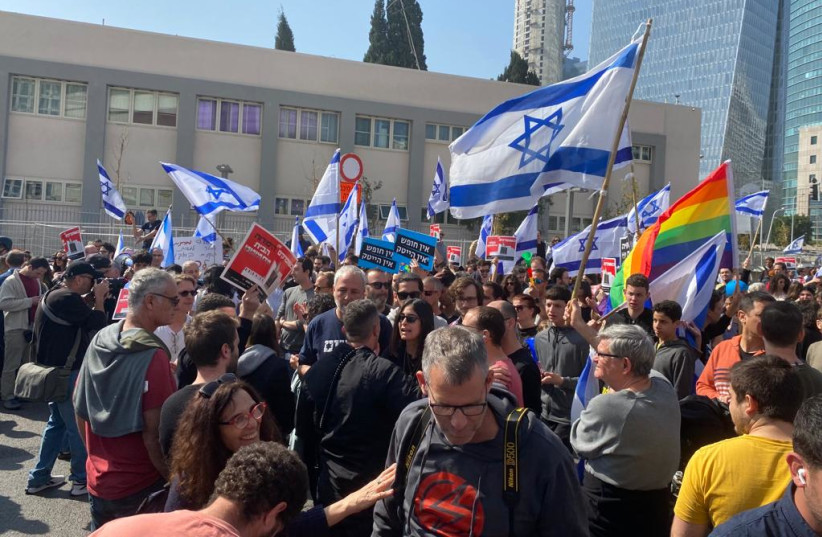Israel is ablaze. Two camps are engaged in a tug of war; one is fighting to keep democracy alive and the other is under the flawed logic of so-called judicial reform, is sowing havoc.
The dangerous judicial procedure initiated by Justice Minister Yariv Levin and Knesset Constitution, Law and Justice Committee chairman Simcha Rothman and orchestrated by Prime Minister Benjamin Netanyahu, as well as haredi faction leaders, is set to cause irrevocable harm to human rights in Israel. There may be no way back from the reality that we are set to be confronted with.
Israel was founded on a Zionist Jewish and democratic vision that is now on the verge of collapse. The Jewish Diaspora is closely monitoring developments in Zion and concerned responses are flooding in.
The Conference of Presidents of Major American Jewish Organizations, which met in Jerusalem this past week and its CEO, William Daroff, expressed their fears that the legal processes will influence the relationship between Israel and the United States. Fifteen Jewish Conservative organizations issued an unprecedented statement in recent days calling for a moratorium on all legislation and for a dialogue headed by President Isaac Herzog, warning that women’s rights in Israel are in jeopardy. The US Ambassador to Israel, Tom Nides, who is also Jewish, stated that the Biden administration has asked Netanyahu to slow down.
Likud’s Diaspora Affairs Minister Amichai Chikli told Nides to mind his own business. When Nides was appointed, it was Chikli’s friends in the coalition who rushed to remind Israelis that the US ambassador was a Jewish individual with a warm regard for Israel.

Vital ties between Israel and the Diaspora
The time has come to discuss the vital ties between Israel and the Diaspora in the context of the general chaos that has been created. Are Diaspora Jews merely generous donors to Israel or are they full partners of Israel and Israelis? And where, if at all, is the line drawn between intervention and interference (this without getting into the contentious grandchild amendment proposed for the Law of Return, which will be addressed in a separate column).
The Conference of Presidents meeting in Jerusalem this past week provided an intriguing glimpse into possible answers to these questions. It appears that the Diaspora, which for many years has seen Israel as a safe and a beacon of freedom and democracy, is now deeply concerned.
Daroff, who has significant influence in the US, has so far refrained from commenting on the judicial revolution but in an interview with Israeli media this week, he stated cautiously that he is concerned about the increasing polarization within Israel and compared the situation to the instability that the US is also experiencing. He urged the Israeli government to do a better job of explaining to the American people the procedures it is carrying out.
THE JEWISH American community and the Conservative movement, which includes members of leading Jewish organizations such as the Jewish Federations of North America, philanthropic funds and pro-Israel organizations, chose to be harsher in their criticism.
In a letter sent last week, the conservative organizations stated that the call they are making is unprecedented from their perspective. Even though this could be interpreted as an intervention in Israel’s internal affairs, the organizations wrote that they felt compelled to act, as representatives of over two million Jews worldwide and out of the deep love they have for Israel, just as they have done in every previous danger or crisis that has befallen Israel in all of its years of existence.
The letter ended with a call for Jews in the Diaspora to speak out on this issue. Unlike the response to the American ambassador, the government refrained from publicly criticizing these Jewish voices and instead pointed a finger at the opposition for running what they claim was a campaign to recruit critical voices against it.
There is no doubt that the vital link between Israel and the Diaspora must continue to serve as a strategic component for both sides, boosting both Israeli national resilience and Jewish affiliation with Israel around the world, through the promotion of education values and the development of joint initiatives.
Multiple polls and research studies teach us that there has been a decline in the level of connection between American Jews and Israel in recent years. If we do not reduce the flames that are erupting here in the Jewish homeland and stop the dangerous legislative maneuvers, we may find ourselves disconnected from most of Diaspora Jewry.
As the representatives of the global Jewish Conservative movement stated, the weakening of the Israeli legal system – which has rightfully gained a prestigious global status – will harm the ability of Jews abroad to claim, as they have done successfully and proudly for tens of years, that Israel is both Jewish and democratic. They are telling us that if the judicial revolution continues at full speed, they will be unable to represent Israel’s interests to the rest of the world and that if this happens, we should not claim that we were not warned.
The writer is a publishing expert at The MirYam Institute. She served as a Knesset member in the 24th Knesset, as well as the deputy head of the Kiryat Tivon Regional Council. She is a senior lecturer in academia and former journalist.
